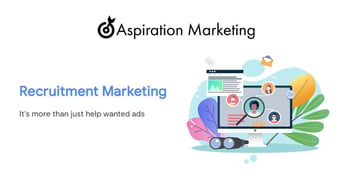The History of Recruitment Marketing and Why It's Here to Stay
Remember those days when filling a vacancy felt like tossing a pebble into a calm pond? You'd post a job ad, and qualified applicants would come swimming in. Those days are as gone as the fax machine.
Today's talent landscape is a churning ocean, and simply throwing out a generic "Help Wanted" sign just won't cut it. Attracting top talent requires a strategic, targeted approach – enter recruitment marketing.
Recruitment marketing is all about casting a compelling net. It's about building a strong employer brand that resonates with the best people in your field. It's about showcasing your company culture, values, and the exciting opportunities you offer.
But this wasn't always the case. With the rise of a competitive candidate-driven market, the power dynamic has shifted. Today's skilled professionals have options. They're bombarded with job offers, so you need to stand out from the crowd.
-
69% of job seekers say a company's employer brand is a very important factor when considering a new job.
-
Companies with strong employer brands receive 50% more applications per job opening.
-
Recruitment marketing can improve the quality of hire by 43%.
Here's the good news: recruitment marketing isn't just about flashy campaigns. It's a data-driven strategy that can demonstrably improve your hiring process. We're talking reduced cost-per-hire, a boost in brand awareness, and a talent pool overflowing with qualified candidates. Buckle up because we're about to dive deep into the fascinating history and powerful future of recruitment marketing.
The Evolution of Recruitment: Pre 1900s-1990s
Long before the digital age, recruitment was a far more localized affair. In the pre-1900s, skilled laborers were often found through word-of-mouth recommendations or physical postings in town squares or guild halls. Imagine a blacksmith seeking an apprentice, relying on the whispers and shouts of the community to find the right fit.
The early 1900s ushered in a new era with the rise of the printed press. Classified ads in newspapers and industry publications became the go-to method for attracting candidates. These ads were basic, focusing primarily on job descriptions and requirements. However, this period also saw the emergence of specialized employment agencies catering to specific sectors like manufacturing or transportation. These agencies acted as intermediaries, connecting skilled workers with companies looking for specific skill sets.
The post-war economic boom of the 1940s and 1950s created a surge in demand for skilled labor. Companies needed innovative ways to attract talent in this competitive environment. This period marked the rise of employer branding, a concept that goes beyond simply listing job duties. Companies began crafting company brochures and targeted advertising campaigns in trade publications. These brochures showcased company culture, employee benefits, and the promise of career growth – all aimed at enticing the best and brightest minds.
The 1960s and 1970s witnessed a further evolution in recruitment strategies. Television commercials and radio ads emerged as new tools for reaching a wider audience of potential candidates. Companies started to focus heavily on company culture, highlighting a positive work environment and attractive benefits packages to stand out from the competition. This era saw the early seeds of employer branding blossom, with companies striving to create a distinct and appealing identity for potential recruits.
Finally, the 1980s and 1990s ushered in the digital revolution, forever changing the landscape of recruitment. Job boards like Monster and CareerBuilder became prominent, marking a significant shift towards online recruitment. These platforms offered a more efficient way for companies to post job openings and for candidates to search for opportunities. Additionally, the rise of applicant tracking systems (ATS) in this period streamlined the applicant screening process, allowing companies to manage a larger volume of applications.
The Dawn of Modern Recruitment Marketing: Early 2000s-2010s
The turn of the millennium marked a pivotal shift in recruitment strategies. With the early 2000s came the explosion of social media platforms like LinkedIn and Facebook. These platforms weren't just for connecting with friends and family anymore; they became powerful tools for employer branding and candidate engagement. Companies began creating engaging profiles that showcased their company culture, mission, and employee stories. Social media allowed for a more interactive and personalized approach to recruitment, fostering two-way communication with potential candidates.
The mid-2000s witnessed the emergence of content marketing as a key weapon in the recruitment marketing arsenal. Companies started developing informative and engaging content like blog posts, articles, and videos specifically tailored to attract talent. Career pages transformed from static information hubs into dynamic platforms that showcased a company's unique offerings. This content marketing approach allowed companies to establish themselves as thought leaders in their industries, attracting skilled professionals who shared their values and interests.
By the late 2000s and early 2010s, the mobile revolution had well and truly begun. Smartphones became ubiquitous, and companies had to adapt their recruitment strategies accordingly. A mobile-friendly career website became a non-negotiable. Candidates were increasingly searching for jobs and researching companies on their phones, so ensuring a seamless mobile experience became crucial.
This period also saw a growing focus on the candidate experience. Companies started paying close attention to every step of the application process, from the ease of applying to the timeliness of communication. A positive candidate experience not only improved the chances of attracting top talent but also helped build a strong employer brand and encourage positive word-of-mouth.
Modern Recruitment Marketing: Today
The landscape of talent acquisition has undergone a dramatic shift. Gone are the days of simply posting a job ad and waiting for a flood of qualified applicants. Today, we operate in a candidate-driven market. A staggering 70% of skilled professionals are considered passive candidates. This means they're not actively searching for new jobs, but they might be open to the right opportunity if presented well.
So, how do you attract these top performers in a competitive environment? Enter recruitment marketing. It's the art and science of attracting and engaging talent by building a strong employer brand.
Think of your employer brand as your company's reputation as a workplace. A strong employer brand resonates with your ideal candidates, showcasing your company culture, values, and the unique experiences you offer. Recruitment marketing allows you to tell your story in a compelling way, attracting candidates who are not only qualified but also a good cultural fit.
The benefits of a well-executed recruitment marketing strategy are undeniable. Studies have shown that it can lead to a significant reduction in cost-per-hire. By attracting a pool of highly qualified candidates, you spend less time and resources sifting through unqualified applications. Additionally, recruitment marketing can dramatically increase your brand awareness. By actively engaging with potential candidates on social media and through informative content, you build a stronger presence in the talent marketplace.
However, perhaps the most crucial benefit is the ability to improve the quality of candidates you attract. By presenting a transparent and compelling employer brand, you weed out those who aren't a good fit and attract top talent who are genuinely interested in your company and its mission.
Examples and Success Stories
Let's look at some real-world examples of successful recruitment marketing campaigns. Warby Parker, the trendy eyewear company, leveraged social media to showcase their vibrant office culture and employee stories. They used platforms like Instagram to share behind-the-scenes glimpses of team member life, fostering a sense of transparency and fun that resonated with millennials seeking a dynamic work environment.
Another innovative approach involves using employer review platforms like Glassdoor to your advantage. Companies like HubSpot have actively engaged with employee reviews on Glassdoor, openly addressing concerns and highlighting positive aspects of their company culture. This transparency builds trust with potential candidates who are increasingly turning to online reviews for insights into a company's work environment.
The rise of talent communities is another powerful trend in recruitment marketing. These online communities act as a bridge between companies and potential employees. They provide a platform for companies to share valuable content, host industry events, and foster relationships with potential candidates long before they're actively seeking a new job. Additionally, employee advocacy programs can be a powerful tool for building a strong employer brand. By encouraging employees to share their positive experiences on social media and professional networks, companies can leverage the authenticity and reach of their own workforce to attract top talent.
Ultimately, recruitment marketing isn't just a fad; it's a strategic necessity in today's talent-driven market. By investing in building a strong employer brand and engaging with potential candidates through targeted marketing efforts, companies can attract the best and brightest, ultimately gaining a significant competitive advantage.
The Future of Recruitment Marketing: Why It's Here to Stay
The talent landscape is a living organism – constantly evolving and adapting. What works today might not be effective tomorrow. This is why successful recruitment marketing requires a commitment to continuous learning and adaptation. Staying ahead of the curve and embracing new technologies will be key to attracting top talent in the years to come.
Personalization is Crucial
One of the most significant trends shaping the future of recruitment marketing is the growing importance of personalization. Gone are the days of generic messaging that blasts out to a wide audience. Today's candidates crave targeted communication that resonates with their specific needs and career goals. This means tailoring your content and outreach efforts to well-defined candidate personas. By understanding the motivations, skills, and preferred communication channels of your ideal candidates, you can deliver highly personalized messages that grab their attention and increase engagement.
The Rise of AI
The rise of artificial intelligence (AI) is also poised to revolutionize recruitment marketing. AI can automate repetitive tasks such as resume screening and interview scheduling, freeing up valuable time for recruiters to focus on the more strategic and human aspects of the hiring process. Imagine an AI system that can analyze resumes and identify top candidates based on a set of pre-defined criteria. This allows recruiters to spend less time sifting through resumes and more time building relationships with the most promising applicants.
However, it's important to remember that AI is a tool, not a replacement. The human touch remains crucial in building genuine connections with potential hires. AI can help streamline the process, but ultimately, a skilled recruiter with strong interpersonal skills is still essential for attracting and retaining top talent.
A New Era in Recruitment
Recruitment marketing has transformed from a niche tactic to a core function for any company seeking to thrive in today's competitive market. By embracing continuous adaptation, personalization, and the strategic use of technology like AI, companies can build a strong employer brand and attract the best and brightest talent. Recruitment marketing isn't a fad; it's the future of attracting and retaining a loyal and high-performing workforce.
From localized word-of-mouth to the sophisticated strategies of today, one thing remains constant: the need to attract top talent. But the methods have evolved dramatically. Today, building a strong employer brand is essential, and recruitment marketing is the key to attracting candidates who are not only qualified but truly a good fit for your company culture.
Are you ready to harness the power of recruitment marketing for your company? Aspiration Marketing is a leading expert in crafting data-driven recruitment marketing strategies that help businesses attract and retain top talent.
Contact us today to learn how we can help you build a strong employer brand and win the war for talent!
This content is also available in:
- German: Die Geschichte des Personalmarketings und warum es von Dauer ist.
- Spanish: La historia del marketing de contratación y por qué va a durar
- French: L'histoire du marketing de recrutement et sa pérennité
- Italian: La storia del marketing del reclutamento e il perché è qui per restare
- Romanian: Istoria marketingului de recrutare și de ce este aici pentru a rămâne
- Chinese: 招聘营销的历史及其长盛不衰的原因

Claudia, a People Operations leader with 9+ years of experience in HR strategy, employer branding, and employee engagement, has guided human resources functions for several high-growth international companies. She played a key role in developing the global employer branding strategy at UiPath during its critical expansion phase. Claudia's expertise lies in scaling People Operations and building the essential HR frameworks that enable dynamic companies to grow effectively.









Leave a Comment